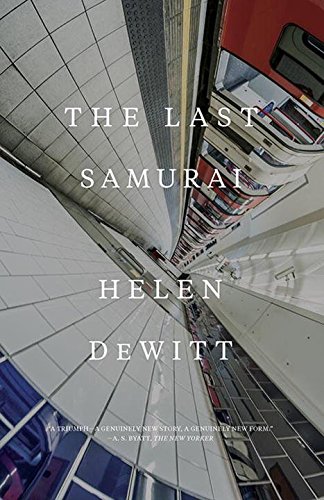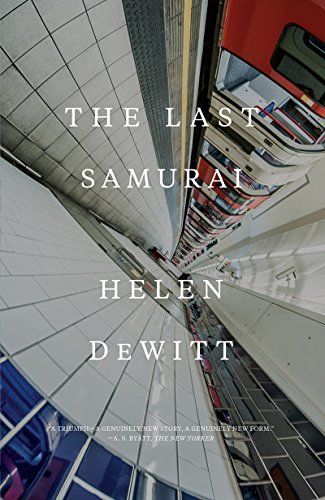-
The Last Samurai
Helen DeWitt
Paperback (New Directions, May 31, 2016)Called “remarkable” (The Wall Street Journal) and “an ambitious, colossal debut novel” (Publishers Weekly), Helen DeWitt’s The Last Samurai is back in print at lastHelen DeWitt’s 2000 debut, The Last Samurai, was “destined to become a cult classic” (Miramax). The enterprising publisher sold the rights in twenty countries, so “Why not just, ‘destined to become a classic?’” (Garth Risk Hallberg) And why must cultists tell the uninitiated it has nothing to do with Tom Cruise?Sibylla, an American-at-Oxford turned loose on London, finds herself trapped as a single mother after a misguided one-night stand. High-minded principles of child-rearing work disastrously well. J. S. Mill (taught Greek at three) and Yo Yo Ma (Bach at two) claimed the methods would work with any child; when these succeed with the boy Ludo, he causes havoc at school and is home again in a month. (Is he a prodigy, a genius? Readers looking over Ludo’s shoulder find themselves easily reading Greek and more.) Lacking male role models for a fatherless boy, Sibylla turns to endless replays of Kurosawa’s masterpiece Seven Samurai. But Ludo is obsessed with the one thing he wants and doesn’t know: his father’s name. At eleven, inspired by his own take on the classic film, he sets out on a secret quest for the father he never knew. He’ll be punched, sliced, and threatened with retribution. He may not live to see twelve. Or he may find a real samurai and save a mother who thinks boredom a fate worse than death.
-
The Last Samurai
Helen DeWitt
eBook (New Directions, May 31, 2016)Called “remarkable” (The Wall Street Journal) and “an ambitious, colossal debut novel” (Publishers Weekly), Helen DeWitt’s The Last Samurai is back in print at lastHelen DeWitt’s 2000 debut, The Last Samurai, was “destined to become a cult classic” (Miramax). The enterprising publisher sold the rights in twenty countries, so “Why not just, ‘destined to become a classic?’” (Garth Risk Hallberg) And why must cultists tell the uninitiated it has nothing to do with Tom Cruise?Sibylla, an American-at-Oxford turned loose on London, finds herself trapped as a single mother after a misguided one-night stand. High-minded principles of child-rearing work disastrously well. J. S. Mill (taught Greek at three) and Yo Yo Ma (Bach at two) claimed the methods would work with any child; when these succeed with the boy Ludo, he causes havoc at school and is home again in a month. (Is he a prodigy, a genius? Readers looking over Ludo’s shoulder find themselves easily reading Greek and more.) Lacking male role models for a fatherless boy, Sibylla turns to endless replays of Kurosawa’s masterpiece Seven Samurai. But Ludo is obsessed with the one thing he wants and doesn’t know: his father’s name. At eleven, inspired by his own take on the classic film, he sets out on a secret quest for the father he never knew. He’ll be punched, sliced, and threatened with retribution. He may not live to see twelve. Or he may find a real samurai and save a mother who thinks boredom a fate worse than death.
-
The Last Samurai
Helen De Witt
Hardcover (Miramax, Sept. 20, 2000)Helen DeWitt's extraordinary debut, The Last Samurai, centers on the relationship between Sibylla, a single mother of precocious and rigorous intelligence, and her son, who, owing to his mother's singular attitude to education, develops into a prodigy of learning. Ludo reads Homer in the original Greek at 4 before moving on to Hebrew, Japanese, Old Norse, and Inuit; studying advanced mathematical techniques (Fourier analysis and Laplace transformations); and, as the title hints, endlessly watching and analyzing Akira Kurosawa's masterpiece, The Seven Samurai. But the one question that eludes an answer is that of the name of his father: Sibylla believes the film obliquely provides the male role models that Ludo's genetic father cannot, and refuses to be drawn on the question of paternal identity. The child thinks differently, however, and eventually sets out on a search, one that leads him beyond the certainties of acquired knowledge into the complex and messy world of adults.The novel draws on themes topical and perennial--the hothousing of children, the familiar literary trope of the quest for the (absent) father--and as such, divides itself into two halves: the first describes Ludo's education, the second follows him in his search for his father and father figures. The first stresses a sacred, Apollonian pursuit of logic, precise (if wayward) erudition, and the erratic and endlessly fascinating architecture of languages, while the second moves this knowledge into the world of emotion, human ambitions, and their attendant frustrations and failures.The Last Samurai is about the pleasure of ideas, the rich varieties of human thought, the possibilities that life offers us, and, ultimately, the balance between the structures we make of the world and the chaos that it proffers in return. Stylistically, the novel mirrors this ambivalence: DeWitt's remarkable prose follows the shifts and breaks of human consciousness and memory, capturing the intrusions of unspoken thought that punctuate conversation while providing tantalizing disquisitions on, for example, Japanese grammar or the physics of aerodynamics. It is remarkable, profound, and often very funny. Arigato DeWitt-sensei. --Burhan Tufail
-
The Last Samurai
Helen De Witt
Paperback (Miramax, April 3, 2002)Helen DeWitt's extraordinary debut, The Last Samurai, centers on the relationship between Sibylla, a single mother of precocious and rigorous intelligence, and her son, who, owing to his mother's singular attitude to education, develops into a prodigy of learning. Ludo reads Homer in the original Greek at 4 before moving on to Hebrew, Japanese, Old Norse, and Inuit; studying advanced mathematical techniques (Fourier analysis and Laplace transformations); and, as the title hints, endlessly watching and analyzing Akira Kurosawa's masterpiece, The Seven Samurai. But the one question that eludes an answer is that of the name of his father: Sibylla believes the film obliquely provides the male role models that Ludo's genetic father cannot, and refuses to be drawn on the question of paternal identity. The child thinks differently, however, and eventually sets out on a search, one that leads him beyond the certainties of acquired knowledge into the complex and messy world of adults.The novel draws on themes topical and perennial--the hothousing of children, the familiar literary trope of the quest for the (absent) father--and as such, divides itself into two halves: the first describes Ludo's education, the second follows him in his search for his father and father figures. The first stresses a sacred, Apollonian pursuit of logic, precise (if wayward) erudition, and the erratic and endlessly fascinating architecture of languages, while the second moves this knowledge into the world of emotion, human ambitions, and their attendant frustrations and failures.The Last Samurai is about the pleasure of ideas, the rich varieties of human thought, the possibilities that life offers us, and, ultimately, the balance between the structures we make of the world and the chaos that it proffers in return. Stylistically, the novel mirrors this ambivalence: DeWitt's remarkable prose follows the shifts and breaks of human consciousness and memory, capturing the intrusions of unspoken thought that punctuate conversation while providing tantalizing disquisitions on, for example, Japanese grammar or the physics of aerodynamics. It is remarkable, profound, and often very funny. Arigato DeWitt-sensei. --Burhan Tufail
-
The Last Samurai by Helen De Witt
Helen De Witt
Paperback (Miramax, March 15, 1656)Excellent Book
-
The Last Samurai
helen dewitt
Paperback (vintage uk, March 15, 2018)New
-
The Last Samurai
Helen DeWitt
Paperback (Vintage/Ebury (a Division of Random, Oct. 4, 2001)Sibylla, a single mother from a long line of frustrated talents, has unusual ideas about child rearing. Yo Yo Ma started piano at the age of two; her son starts at three. J.S. Mill learned Greek at three; Ludo starts at four, reading Homer as they travel round and round the Circle Line. A fatherless boy needs male role models; so she plays the film of Seven Samurai as a running backdrop to his childhood. While Sibylla types out back copies of Carpworld to pay the rent, Ludo, aged five, moves on the Hebrew, Arabic and Japanese, aerodynamics and edible insects of the world - they might come in handy, if he can just persuade his mother he's mature enough to know his father's name. He is bound for knowledge of a less manageable sort, not least about his mother's past. And at the heart of the book is the boy's changing relationship with Sibylla - contradictory, touching and tender.
-
The Last Samurai
Helen De Witt
Hardcover (Miramax, Sept. 20, 2000)None
-
The Last Samurai
Helen DeWitt
Hardcover (Chatto and Windus, March 15, 2000)None
-
The Last Samurai
Helen Dewitt
Hardcover (Chatto, March 15, 2000)This novel is the basis of the motion picture by the same title.
-
The Last Samurai : A Novel
Helen DeWitt
Paperback (Knopf Canada, March 15, 2001)None
-
The Last Samurai
Helen Dewitt
Paperback (Chatto & Windus, March 15, 2000)None